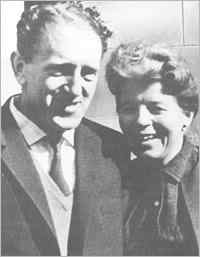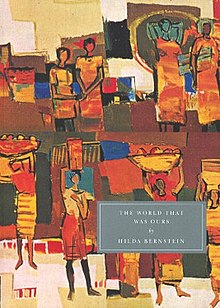The World that was Ours (1967) is Hilda Bernstein's personal account of life in Johannesburg under the oppressive surveillance of the apartheid regime. Hilda and her husband Rusty Bernstein were both detained, along with many others, in the aftermath of the Sharpeville massacre of 1960. Upon their release, Rusty was placed under house arrest, while Hilda's day-to-day activities were closely monitored by the Special Branch, if not altogether prohibited. Her memoir recalls these fraught years in the build-up to the landmark Rivonia Trial, the events and ordeals of the Trial itself, and finally the couple's reluctant decision to flee their beloved country in the wake of Rusty's acquittal.
While on the one hand The World that was Ours offers vivid historical insight into the tumultuous climate of Johannesburg in the early 1960s, on the other it reads as a poignant and emotional recollection of the narrator's personal dilemmas, as a mother, a wife and a political activist, torn between her private and public responsibilities. 'This has survived as a South African classic,' wrote Anthony Sampson in the Spectator, 'not just because it's beautifully written, but because it conveys the combination of ordinariness and danger which is implicit in any totalitarian state.'
The World that was Ours is dedicated to 'the men of Rivonia' - Nelson Mandela, Walter Sisulu, Ahmed Kathrada, Denis Goldberg, Govan Mbeki, Elias Motsoaledi, Andrew Mlangeni and Rusty Bernstein - as well as to their devoted counsel, Bram Fischer.

uMkhonto we Sizwe was the armed wing of the African National Congress (ANC), co-founded by Nelson Mandela in the wake of the Sharpeville massacre. Its mission was to fight against the South African government.

Walter Max Ulyate Sisulu was a South African anti-apartheid activist and member of the African National Congress (ANC), serving at times as Secretary-General and Deputy President of the organization. He was incarcerated at Robben Island, where he served more than 25 years' imprisonment.

The Rivonia Trial took place in South Africa between 9 October 1963 and 12 June 1964. The Rivonia Trial led to the imprisonment of Nelson Mandela and the others among the accused who were convicted of sabotage and sentenced to life at the Palace of Justice, Pretoria.

Govan Archibald Mvuyelwa Mbeki was a South African politician, Communist and son of Chief Sikelewu Mbeki and Johanna Mahala and also the father of the former South African president Thabo Mbeki and political economist Moeletsi Mbeki. He was a leader of the South African Communist Party and the African National Congress. After the Rivonia Trial, he was imprisoned (1963–1987) on charges of terrorism and treason, together with Nelson Mandela, Walter Sisulu, Raymond Mhlaba, Ahmed Kathrada and other eminent ANC leaders, for their role in the ANC's armed wing, Umkhonto we Sizwe (MK). He was sometimes mentioned by his nickname "Oom Gov".
Raymond Mphakamisi Mhlaba was an anti-apartheid activist, Communist and leader of the African National Congress (ANC) also as well the first premier of the Eastern Cape. Mhlaba spent 25 years of his life in prison. Well known for being sentenced, along with Nelson Mandela, Govan Mbeki, Walter Sisulu and others in the Rivonia Trial, he was an active member of the ANC and the South African Communist Party (SACP) all his adult life. His kindly manner brought him the nickname "Oom Ray".

Sandton is an affluent municipality in the Gauteng Province, South Africa and forms part of the City of Johannesburg Metropolitan Municipality. The name of the town came from the combination of two of its suburbs, Sandown and Bryanston. In 1969 Sandton was promulgated as a municipality in its own right, but lost its status as an independent town after the re-organisation of South African local governments after Apartheid ended.
Abraham Louis Fischer was a South African lawyer of Afrikaner descent, notable for anti-apartheid activism and for the legal defence of anti-apartheid figures, including Nelson Mandela, at the Rivonia Trial. Following the trial he was himself put on trial accused of furthering communism. He was sentenced to life imprisonment, and diagnosed with cancer while in prison. The South African Prisons Act was extended to include his brother's house in Bloemfontein where he died two months later.

Ahmed Mohamed Kathrada, sometimes known by the nickname "Kathy", was a South African politician and anti-apartheid activist.
The Treason Trial was a trial in Johannesburg in which 156 people, including Nelson Mandela, were arrested in a raid and accused of treason in South Africa in 1956.
The following lists events that happened during 1963 in South Africa.

Rivonia is a suburb of Johannesburg, South Africa in the Sandton area. It is located in Region E of the City of Johannesburg Metropolitan Municipality. Rivonia is one of the most affluent residential and business suburbs of Johannesburg, and regarded as the hub of upstart and established I.T. companies. The main retail thoroughfare in the area, Rivonia Boulevard, is the location of several shopping complexes as well as many other shops and restaurants. The area known as Rivonia includes the original township of Edenburg, Edenburg Extension 1, and 19 smaller extensions designated 'Rivonia Extension ...', numbered from 0 to 25. There is no designated township called Rivonia. The post code for Rivonia is 2128.

Denis Theodore Goldberg was a South African social campaigner, who was active in the struggle against apartheid. He was accused No. 3 in the Rivonia Trial, alongside the better-known Nelson Mandela and Walter Sisulu, where he was also the youngest of the defendants. He was imprisoned for 22 years, along with other key members of the anti-apartheid movement in South Africa. After his release in 1985 he continued to campaign against apartheid from his base in London with his family, until the apartheid system was fully abolished with the 1994 election. He returned to South Africa in 2002 and founded the non-profit Denis Goldberg Legacy Foundation Trust in 2015. He was diagnosed with lung cancer in July 2019, and died in Cape Town on 29 April 2020.

Lionel "Rusty" Bernstein was a Jewish South African anti-apartheid activist and political prisoner. He played a key role in political organizations such as the South African Communist Party (SACP) and the African National Congress (ANC). He helped form the Congress of Democrats to bolster white participation in the ANC, and he brought its allies together to establish a Congress of the People, working closely with Nelson Mandela.

Hilda Bernstein was a British-born author, artist, and an activist against apartheid and for women's rights.

Liliesleaf Farm is a location in northern Johannesburg, South Africa, which is most noted for its use as a safe house for African National Congress activists in the 1960s. In 1963, the South African police raided the farm, arresting more than a dozen ANC leaders and activists, who were then tried and prosecuted during the Rivonia Trial. Since the end of apartheid, the area has been turned into a museum and heritage site.
The South African Congress of Democrats (SACOD) was a radical left-wing white, anti-apartheid organization founded in South Africa in 1952 or 1953 as part of the multi-racial Congress Alliance, after the African National Congress (ANC) invited whites to become part of the Congress Movement.

Vernon Celliers Berrangé SCOT "Defender of the People" was an eminent South African human rights advocate (QC)

"I Am Prepared to Die" is the name given to the three-hour speech given by Nelson Mandela on 20 April 1964 from the dock of the defendant at the Rivonia Trial. The speech is so titled because it ends with the words "it is an ideal for which I am prepared to die". The speech is considered one of the great speeches of the 20th century, and a key moment in the history of South African democracy.
I have dedicated my life to this struggle of the African people. I have fought against white domination, and I have fought against black domination. I have cherished the ideal of a democratic and free society in which all persons will live together in harmony and with equal opportunities. It is an ideal for which I hope to live for and to see realized. But, My Lord, if it needs to be, it is an ideal for which I am prepared to die.
Christina 'Chrissie' Jasson was a South African clerk and trade unionist from Port Elizabeth, who stood accused of treason at the Rivonia Trial.










